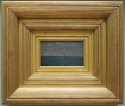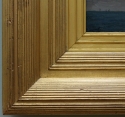The Paintings of James McNeill Whistler
YMSM 381
The Sea, Brittany

Date
The Sea, Brittany was probably painted in 1888.

The Sea, Brittany, The Hunterian
The butterfly signature indicates a date of 1888 or shortly after. When Whistler married Beatrice Philip (Mrs E. W. Godwin, Mrs J. McN. Whistler) (1857-1896), he incorporated a trefoil in his butterfly signature, both because he said Beatrice was his 'Luck' and also because her monogram (P, reversed, and B, for Beatrice Philip) resembled a trefoil.
The Sea, Brittany may have been painted in the autumn of 1888 when the Whistlers were on their honeymoon. On 25 August 1888 Alan S. Cole noted in his diary that he had met them at Boulogne, 'J. sketching on sands.' 1
The Whistlers were also in Brittany in the late summer of 1893, although Whistler wrote at that time that painting had been difficult, if not impossible: 'We came down here to paint sea pieces, and have been unable to look at the sea for three weeks it has been nearly one incessant glare with a cloudless sky.' 2

The Bathing Posts, Brittany, The Hunterian
This oil is difficult to date and somewhat different in style from other seascapes. However, it bears comparison in colour and technique with The Bathing Posts, Brittany y409.
Images

The Sea, Brittany, The Hunterian

The Sea, Brittany, The Hunterian

The Sea, Brittany, frame detail

The Bathing Posts, Brittany, The Hunterian
Subject
Titles
Whistler's original title is not known. Only one title is known, with minor variations in language and punctuation:
- 'La Mer; Bretagne' (1905, Œuvres de James McNeill Whistler, Paris). 3
- 'The Sea – Brittany' (1935, Glasgow University). 4
- The Sea, Brittany (1980, YMSM). 5
The Sea, Brittany is the accepted title, translated from the original French and with punctuation edited for consistency in the 1980 catalogue.
Description

The Sea, Brittany, The Hunterian
A small seascape in horizontal format. The sea is a rich dark blue, the sky pale greenish blue, turquoise and blue with pale grey and lilac fluffy clouds. Seven small sailing boats, possibly fishing boats, are seen on the horizon.
Site
It is assumed from the title that this was painted in Brittany, France.
It has also been assumed that The Sea, Brittany was painted in the autumn of 1888 when Whistler and his wife Beatrice were on their honeymoon. In August they were in Boulogne. They travelled down the Loire, visited Loches, Bourges, Tours and possibly Nantes, and could have visited southern Brittany.
Although they were also in Brittany in the late summer of 1893, visiting Lannion, Paimpol, and Perros Guirec, it is less likely that this work dates from that trip.
Technique
Technique

The Sea, Brittany, The Hunterian
It is on a 2 mm thick softwood panel – probably pine – made from a single piece of timber, with a 2 mm shallow bevel on all sides on the verso. It was primed unevenly (the surface is slightly lumpy) with pale grey priming, which runs over the edges, but was, for once, well covered by the paint.
Whistler used a fairly small brush, less than 2 mm wide, but on such a small panel the brushwork seems surprisingly broad. The blue sea was painted thinly, wet-in-wet. The sky, warm grey clouds, with touches of pale blue, turquoise and greenish-yellow, are painted with soft brush-strokes. The sea may be cobalt blue and the sky is a different blue, likely Prussian blue. 6
Conservation History
The short edges were damaged while the paint was wet, by sliding the panel into the box, and in addition all the edges of the painting were damaged by the frame.
Lead soap formation in the paint has produced tiny pimples on the surface. The varnish is very yellow varnish, and more yellow under the frame. Otherwise the panel is in good condition. 7
Frame

The Sea, Brittany, The Hunterian

The Sea, Brittany, frame detail
Grau Whistler, signed 'F H Grau - London', 1892, 33.0 x 38.9 x 5.5 cm. 8 It was made by Whistler's favourite frame-maker, Frederick Henry Grau (1859-1892). Dating from about 1892, it suggests that the picture was intended for exhibition but, if so, no such exhibition has been identified.
History
Provenance
- 1903: in Whistler's studio at his death and bequeathed to his ward and executrix, Rosalind Birnie Philip (1873-1958);
- 1935: given by Miss R. Birnie Philip to the University of Glasgow.
Exhibitions
- 1905: Œuvres de James McNeill Whistler, Palais de l'Ecole des Beaux-Arts, Paris, 1905 (cat. no. 76) as 'La Mer; Bretagne'.
It was not, as far as is known, exhibited during Whistler's lifetime. The first known exhibition was in Paris in 1905.
When it was shown at Colnaghi's in London in 1915, the Observer, in a generally critical review, singled it out as among 'a few things of supreme quality':
"The tiny little painting, 'The Sea: Brittany,' is an achievement of astounding completeness, considering the summary breadth of handling and the minuteness of scale: just a bit of the sea on a clear, bright day, with a few sailing boats on the distant horizon, with the swell of the water ... the relation of the waters and the sky -- everything is indicated with a precision and sureness that were by no means always at Whistler's command." 9
Similarly, the art critic of The Times praised it:
"The little oil painting 'The Sea: Brittany' ... is just the sea and the sky. It is not Whistler telling us that he will do as he pleases because he is a great artist. There he has forgotten himself in what he has seen, and has painted like a poet who makes music of his memory of some event. The movement of the clouds, of the ships, of the waves - those are what touched him in reality, and these he gives us quite simply and directly without thinking of the butterfly and all its controversies." 10
By the terms of Miss Birnie Philip's gift to the University of Glasgow, it is not now lendable to another venue.
Bibliography
Catalogues Raisonnés
- Young, Andrew McLaren, Margaret F. MacDonald, Robin Spencer, and Hamish Miles, The Paintings of James McNeill Whistler, New Haven and London, 1980 (cat. no. 381), plate 241, as 'The Sea, Brittany'.
Authored by Whistler
- None.
Catalogues 1855-1905
- Œuvres de James McNeill Whistler, Palais de l'Ecole des Beaux-Arts, Paris, 1905 (cat. no. 76) as 'La Mer; Bretagne'.
Journals 1855-1905
- None.
Monographs
- None.
Books on Whistler
- Cary, Elizabeth Luther, The Works of James McNeill Whistler: A Study, with a Tentative List of Artist’s Works, New York, 1907, p. 192 (cat. no. 218).
Books, General
- None.
Catalogues 1906-Present
- Loan Exhibition of Works by James McNeill Whistler to aid the Professional Classes War Relief Council, Messrs Colnaghi, London, 1915 (cat. no. 40).
- James McNeill Whistler, University of Glasgow, Glasgow, 1935 (cat. no. 8).
Journals 1906-Present
- None.
Newspapers 1906-Present
- Anon., 'A Whistler Exhibition', The Times, London, 1 June 1915, p. 11.
- Anon., 'Art and Artists. A Whistler Exhibition', The Observer, London, 6 June 1915.
Websites
- The Hunterian website at http://collections.gla.ac.uk/#/details/ecatalogue/41129.
Unpublished
- Revillon, Joseph Whistler, Draft Catalogue Raisonné of the Paintings of J. McN. Whistler, [ca 1945-1955], Glasgow University Library (cat. no. 409).
Other
- Parkerson, Sarah Lawrence, Variations in Gold: The Stylistic Development of the Picture Frames used by James McNeill Whistlers, PhD thesis, University of Glasgow, 2007.
Notes:
1: Copy, GUW #03432.
2: Whistler to Max Williams, [15 August/10 September 1893], GUW #11717.
3: Œuvres de James McNeill Whistler, Palais de l'Ecole des Beaux-Arts, Paris, 1905 (cat. no. 76).
4: James McNeill Whistler, University of Glasgow, Glasgow, 1935 (cat. no. 8).
5: YMSM 1980 [more] (cat. no. 381).
6: Dr Joyce H. Townsend, Chief Conservator, Tate Britain, Report of examination, August 2017. The cobalt blue has a faint fluorescence under ultra-violet light, and the other blue was identified under infra-red as possibly Prussian blue.
7: Clare Meredith, condition report, 23 April 2001, Hunterian files. Townsend 2017, op. cit.
8: Dr S. L. Parkerson Day, Report on frames, 2017; see also Parkerson 2007 [more].
9: 'Art and Artists. A Whistler Exhibition', The Observer, 6 June 1915; cutting in GUL Whistler PC21, p. 23.
10: Anon., 'A Whistler Exhibition', The Times, London, 1 June 1915, p. 11.